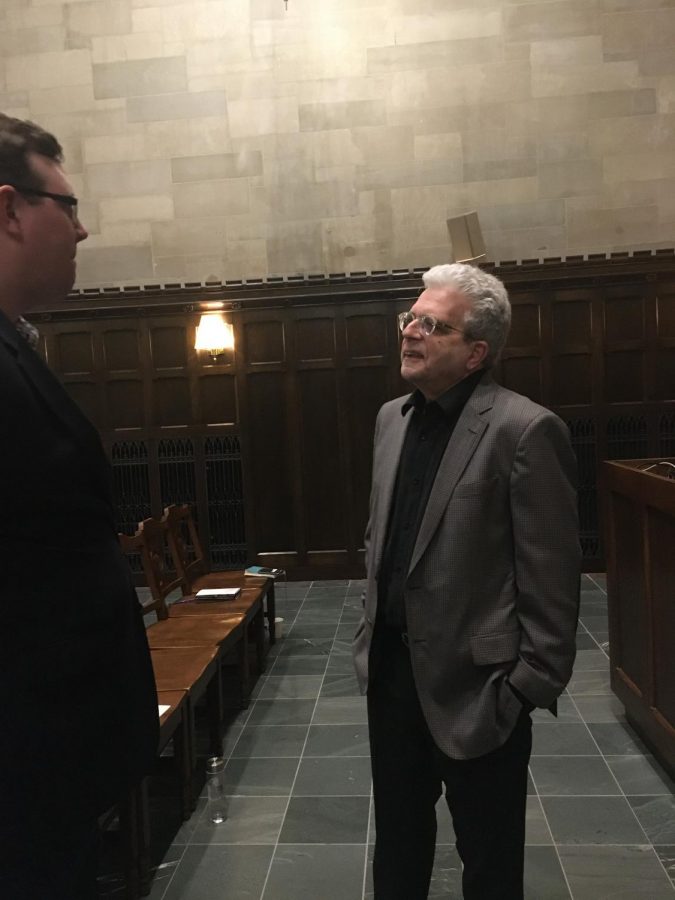The Curran Center for American Catholic Studies Presents Lecture
On Tuesday, March 5, the Curran Center for American Catholic Studies hosted a lecture on the sexual dynamics of modern Catholicism, presented by Robert Orsi of Northwestern University. Orsi taught at Fordham College Lincoln Center (FCLC) between 1981 and 1988, and later taught at Harvard University. He currently teaches at Northwestern University and serves as the Grace Craddock Nagle chair in Catholic studies at Northwestern University.
Orsi has written several books on the topic of religious studies, including “History and Presence and Between Heaven and Earth: The Religious Worlds People Make and the Scholars Who Study Them.” He is currently working on another book, “Give Us Boys,” which will be published by Columbia University Press in 2022.
The lecture, titled “The Sexual Dynamics of Modern Catholicism,” centered around sexuality in Catholicism and the effects of the Catholic church’s views on sex. Orsi specifically spoke on ways in which these views relate to the sexual abuses and hypocrisies committed by members of the clergy in the Catholic Church sexual abuse cases.
Orsi said that the reveal of the sexual abuse cases in the ’80s and ’90s has been widely treated by the Catholic Church in the past as a contemporary perversion of power and the failure of authorities. He argues that in actuality, these abuses are a continuation of sexual dynamics present in modern Catholicism from the 1600s onward.
Among Martin Luther’s condemnations of the Catholic Church for the selling of indulgences and the exclusivity of the Bible were his virulent accusations of hypocrisy on the subject of sexual sins in the clergy.
“The council’s response to Luther’s relentless excoriations was to institutionalize the high late-medieval vision of the priesthood by reaffirming clerical celibacy while at the same time improving, regulating and standardizing clerical formation, intellectual and spiritual, and then surrounding the new Tridentine ideal of the priest with various mechanisms of control and surveillance,” said Orsi.
He continued to explain that changes to the hierarchy of the clergy instituted in the Council of Trent paved the way for the continued abuses of power committed by members of the clergy.
The Council of Trent’s solution to the widely acknowledged problem of misconduct on the part of supposedly-secular priests was the establishment of an “empire of closets.”
Orsi said this empire of closets revolved around the continual coverup and complicity during cases of abuse perpetrated by members of the celibate clergy. He said this was achieved through the veneration of priests due to their transcendent practice of celibacy, a practice which gave the clergy a hierarchical advantage over the sexually active lay people. These closets often became increasingly transparent, which led to an uneasy tolerance of indecent conduct. It would become an open secret that, despite being known, was not or could not be stopped.
Orsi said the intersection of race and class further served to enable the exploitation of vulnerable populations by certain members of the clergy, as the already-pervasive role of hierarchy and power imbalances within the clergy extended to the people that the priests were left responsible for, as in cases with priests left in charge of emotionally fragile and needy children.
“The sexual, political and religious were not distinct in modern Catholicism,” said Orsi.
There were a number of Fordham students present at the lecture, many present due to the recommendations of their theology professors.
Juan Hertsens Marques, FCLC ’23, said that the lecture was very insightful and perspective-changing with regards to the history of sexuality in Catholicism, especially with its perspective on the empowerment of priests in the Council of Trent allowing for sexual crimes.
“(The lecture was) very direct and emotionally riveting,” he said.

Hasna Ceran is a junior double majoring in economics and Middle East studies. She began by writing the USG Column for Volume 101 and served as an Assistant...







































































































































































































